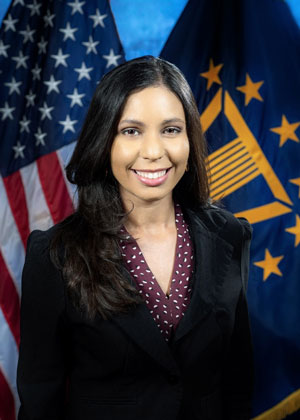VA Homeless Programs
Message from Monica Diaz, Executive Director, VHA Homeless Programs Office
May 2023

Gary East scrapped metal to afford food and necessities.
Teressa White sought shelter in her vehicle.
Ida McDonald relied on local warming shelters and soup kitchens for heat, water, and electricity for nearly four decades.
These Veterans did not experience these harsh conditions in combat zones or while deployed. Tragically, each of these stories’ settings is here—in the very country they served.
Last year, 41% of all Veterans experiencing homelessness were unsheltered, defined by the U.S. Department of Housing and Urban Development as “having a primary location in places not designated for, or ordinarily used as, a regular sleeping accommodation for people.”
Despite significant declines in Veteran homelessness in recent years, communities across the country are seeing increases in the rates of unsheltered homelessness, both among Veterans and the general population. Between 2021 and 2022, unsheltered homelessness rose among all Americans by 7%.
Common catalysts of unsheltered homelessness, such as being laid off, unexpected medical costs, or going through a divorce, can be sudden and unexpected—and can happen to anyone. Like so much else in life, unsheltered homelessness often is simply the result of bad luck.
Most of the Veterans who share their stories with us describe how well their lives were going, full of meaningful careers, families, and hobbies, until one day or event redefined their circumstances in a way they never could have prepared for. As the late Army Veteran John Prine sang, “That’s the way that the world goes ‘round / You’re up one day, the next you’re down.”
But unfortunately, once bad luck knocks an individual down, it can be hard to get back up.
This is especially true in the context of unsheltered homelessness. No matter how hard-working or resilient an individual is, once they become unsheltered, their problems are likely to compound.
The negative health impacts of unsheltered homelessness are multifold. Individuals experiencing unsheltered homelessness face barriers to accessing health care, obtaining essential medical and hygienic supplies and maintaining possession of important personal health records and documents. As a result, unsheltered individuals face increased risk factors for premature mortality, including substance use disorders, serious mental illness, and chronic health conditions.
This year, VA set a goal to engage with at least 28,000 unsheltered Veterans to help them obtain housing and other wraparound services. This goal represents a more than 10% increase in the number of unsheltered Veterans reached last year.
Just as VA achieved—and exceeded—Secretary McDonough’s goal house 38,000 homeless Veterans in 2022, I am confident that we will achieve our goal to engage more unsheltered Veterans this year.
VA’s goal to reach more unsheltered Veterans this year is not a benchmark that will remain on paper. The goal will bring VA social workers and peer support specialists to meet Veterans wherever they are—whether on the street, in encampments, or at congregant meal sites. It will amplify the stories our Veterans share and encourage more Americans to listen.
And reaching the goal will prove that no matter what a Veteran is going through, VA is committed to helping.
Most importantly, reaching this goal will help more Veterans like Gary East, Teressa White, and Ida McDonald connect with safe, stable housing—housing that enables them to focus on their passions, dreams, and next chapters.
And so often, these next chapters are dedicated to helping others. Last spring, when we asked Gary East his plans for the future, he didn’t hesitate: “I’m going to help Veterans.”
We have a long road ahead to end unsheltered homelessness among our Veterans, but no step is too small, and no effort is too insignificant.
We never know who we might inspire, or who will pass the help forward.
To me, “That’s the way the world goes ‘round.”
















